Hong Kong legislative election, 2012
Hong Kong legislative election, 2012

|
|
|
|
|
|
| All to the Legislative Council |
| Opinion polls |
| Turnout |
53.05% (GC)  7.85pp 7.85pp
|
| |
First party |
Second party |
Third party |
| |
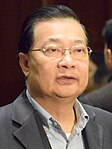 |
 |
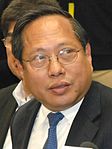 |
| Leader |
Tam Yiu-chung |
Alan Leong |
Albert Ho |
| Party |
DAB |
Civic |
Democratic |
| Alliance |
Pro-Beijing |
Pan-democracy |
Pan-democracy |
| Leader's seat |
New Territories West |
Kowloon East |
District Council (Second) |
| Last election |
10 seats, 22.92% |
5 seats, 13.66% |
8 seats, 20.63% |
| Seats won |
13
(9 GCs + 4 FCs)
|
6
(5 GCs + 1 FC)
|
6
(4 GCs + 2 FCs)
|
| Seat change |
 3 3 |
 1 1 |
 2 2 |
| Popular vote |
366,140 |
255,007 |
247,220 |
| Percentage |
20.22% |
14.08% |
13.65% |
| Swing |
 2.70pp 2.70pp
|
 0.42pp 0.42pp
|
 6.98pp 6.98pp
|
|
| |
Fourth party |
Fifth party |
Sixth party |
| |
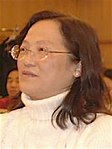 |
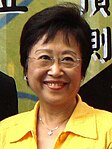 |
 |
| Leader |
Lam Suk-yee |
Miriam Lau |
Lee Cheuk-yan |
| Party |
FTU |
Liberal |
Labour |
| Alliance |
Pro-Beijing |
Pro-Beijing |
Pan-democracy |
| Leader's seat |
Did not stand |
Hong Kong Island
(defeated)
|
New Territories West |
| Last election |
4 seats, 5.70% |
7 seats, 4.33% |
New party |
| Seats won |
6
(3 GCs + 3 FCs)
|
5
(1 GC + 4 FCs)
|
4
(3 GCs + 1 FC)
|
| Seat change |
 2 2 |
 2 2 |
 1 1 |
| Popular vote |
127,857 |
48,702 |
112,140 |
| Percentage |
7.06% |
2.64% |
6.19% |
| Swing |
 1.36pp 1.36pp
|
 1.64pp 1.64pp
|
N/A |
|
| |
Seventh party |
Eighth party |
Ninth party |
| |
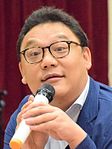 |
 |
 |
| Leader |
Christopher Lau |
Andrew Leung
and others
|
Regina Ip |
| Party |
People Power |
Economic Synergy |
NPP |
| Alliance |
Pan-democracy |
Pro-Beijing |
Pro-Beijing |
| Leader's seat |
Hong Kong Island
(defeated)
|
Industrial (First) |
Hong Kong Island |
| Last election |
New party |
New party |
New party |
| Seats won |
3
(3 GCs)
|
3
(0 GC + 3 FCs)
|
2
(2 GCs)
|
| Seat change |
 1 1 |
 1 1 |
 1 1 |
| Popular vote |
176,250 |
5,717 |
68,097 |
| Percentage |
9.73% |
0.32% |
3.76% |
| Swing |
N/A |
N/A |
N/A |
|
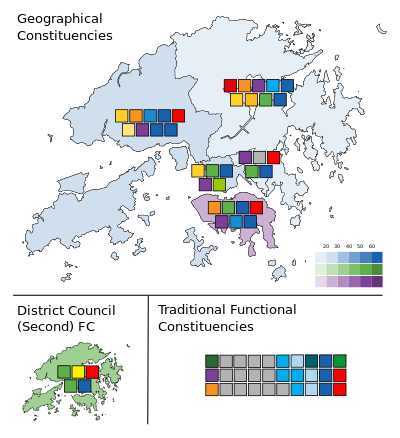
|
| Elected candidates by each constituency |
|

Tsang Yok-sing
DAB
Tsang Yok-sing
DAB
The 2012 Hong Kong Legislative Council election was held on 9 September 2012 for the 5th Legislative Council (LegCo) since the establishment of the Hong Kong Special Administrative Region.
The election was for the new total of 70 seats in LegCo, ten more than previously, with 35 members elected in geographical constituencies through direct elections, and 35 members in functional constituencies. Under new arrangements agreed in a contentious LegCo vote in 2010, five District Council (Second) functional constituency seats each represent all 18 District Councils of Hong Kong voted for by all resident voters in Hong Kong (who did not have a vote in any other functional constituency).
The pro-Beijing camp scored a major success, maintaining its dominance in the functional constituencies and winning 17 of the 35, nearly half, of the geographical constituency seats, which were considered to be the stronghold of the pan-democracy camp. The Democratic Alliance for the Betterment and Progress of Hong Kong (DAB), the flagship Beijing-loyalist party, won 13 seats in total, more than double the tally of either the pro-democracy Democratic Party or Civic Party, or of its sister organisation, the Hong Kong Federation of Trade Unions (FTU), which each won six seats.
...
Wikipedia










